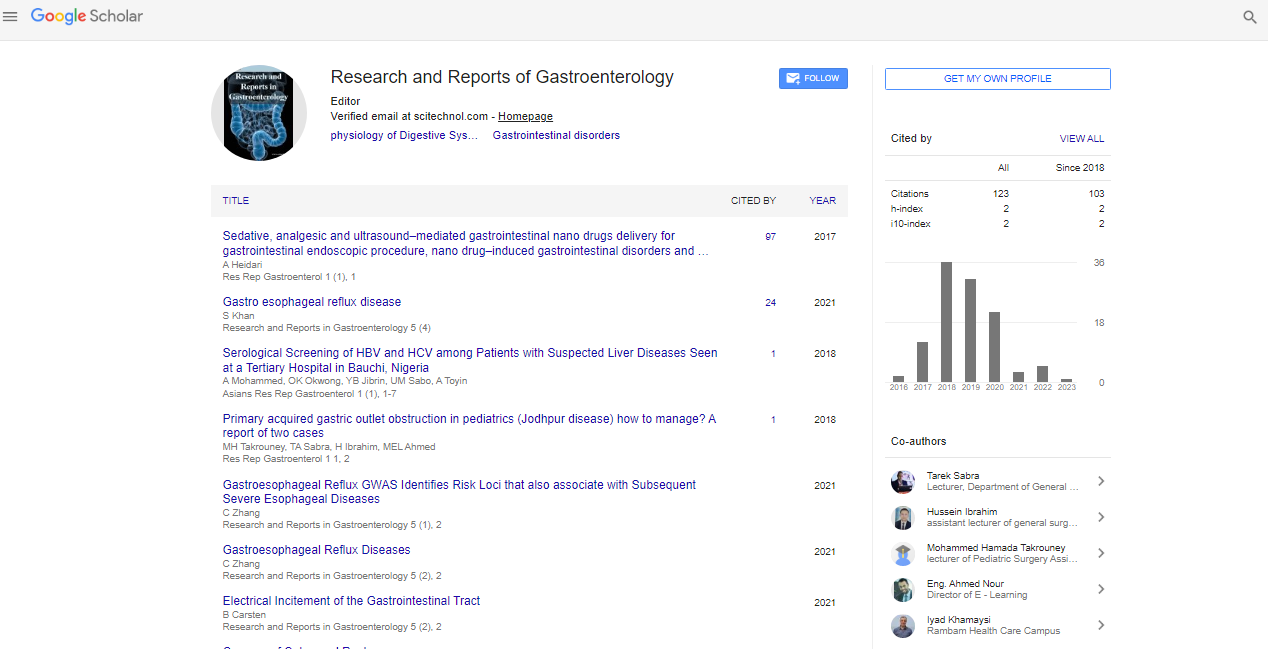Commentary, Res Rep Gastroenterol Vol: 7 Issue: 4
Clostridium difficile Infection: Understanding the Complexities of Infection in Healthcare
Abdulaziz Narula*
1Department of Medicine, Najran University, Najran, Saudi Arabia
*Corresponding Author: Abdulaziz Narula,
Department of Medicine, Najran
University, Najran, Saudi Arabia
E-mail: narulaabdulaziz@gmail.com
Received date: 20 November, 2023 Manuscript No. RRG-24-124069;
Editor assigned date: 22 November, 2023, PreQC No. RRG-24-124069 (PQ);
Reviewed date: 06 December, 2023, QC No. RRG-24-124069;
Revised date: 13 December, 2023, Manuscript No. RRG-24-124069 (R);
Published date: 20 December, 2023, DOI: 10.4172/Rrg.1000160
Citation: Narula A (2023) Clostridium Difficile Infection: Understanding the Complexities of Infection in Healthcare. Res Rep Gastroenterol 7:4.
Descritpion
Clostridium difficile, often referred to as C. difficile or C. diff, is a bacterium that can cause infection and inflammation of the colon. Clostridium Difficile Infection (CDI) is a significant concern in healthcare settings, particularly among individuals who have recently taken antibiotics. The bacterium can produce toxins that damage the lining of the colon, leading to a range of symptoms from mild diarrhea to severe inflammation.
Causes and risk factors
C. difficile is a bacterium that naturally resides in the intestines of some people, typically without causing any harm. However, the balance of the gut microbiota can be disrupted, often due to the use of antibiotics, allowing C. difficile to multiply and release toxins. Antibiotics, while crucial for treating bacterial infections, can also unintentionally eliminate beneficial bacteria in the gut, creating an environment conducive to C. difficile overgrowth.
Other risk factors for CDI include advanced age, prolonged hospitalization, weakened immune system, and underlying medical conditions. The spores of C. difficile are highly resistant and can persist in the environment, contributing to the transmission of the bacterium in healthcare facilities.
CDI can manifest with a spectrum of symptoms, ranging from mild diarrhea to severe and life-threatening complications. Common symptoms include watery diarrhea, abdominal pain, fever, and nausea. In severe cases, CDI can lead to pseudomembranous colitis, a condition characterized by the formation of inflammatory plaques in the colon lining.
The severity of symptoms often correlates with the strain of C. difficile involved and the presence of underlying health conditions in the affected individual. Elderly individuals and those with compromised immune systems are particularly vulnerable to severe forms of CDI.
The diagnosis of CDI involves a combination of clinical evaluation and laboratory testing. Stool samples are analyzed for the presence of C. difficile toxins or the bacterium's DNA. In some cases, additional imaging studies or endoscopic procedures may be performed to assess the extent of colonic involvement and rule out other causes of gastrointestinal symptoms.
Challenges in diagnosis and detection
One of the challenges in diagnosing CDI lies in distinguishing between asymptomatic colonization and true infection. Not everyone colonized with C. difficile will develop symptoms, and detecting the bacterium alone may not necessarily indicate an active infection. Additionally, the emergence of hypervirulent strains, such as the NAP1/BI/027 strain, has posed challenges in managing and containing C. difficile outbreaks in healthcare settings.
The primary treatment for CDI involves discontinuing the use of the antibiotic that triggered the infection and initiating a course of specific antibiotics targeting C. difficile. Metronidazole, vancomycin, and fidaxomicin are commonly used antibiotics, with the choice depending on the severity of the infection. In recurrent or severe cases of CDI, Fecal Microbiota Transplantation (FMT) has emerged as a promising therapeutic approach. FMT involves the transfer of fecal material from a healthy donor to the patient's gastrointestinal tract, aiming to restore a healthy balance of gut bacteria.
Preventing the spread of CDI is a multifaceted challenge that requires a combination of infection control measures, antibiotic stewardship, and vigilant healthcare practices. Key preventive strategies include:
• Strict adherence to hand hygiene practices among healthcare providers and visitors is crucial in preventing the transmission of C. difficile spores.
• Implementing isolation precautions for patients with suspected or confirmed CDI helps contain the spread of the bacterium within healthcare facilities.
• Rational and judicious use of antibiotics is essential in preventing the disruption of the gut microbiota and reducing the risk of CDI.
• Thorough cleaning and disinfection of surfaces in healthcare settings help eliminate C. difficile spores and reduce the risk of transmission.
Clostridium difficile infection poses a substantial challenge in healthcare, impacting vulnerable individuals and contributing to the burden of healthcare-associated infections. The interplay of factors such as antibiotic use, the persistence of C. difficile spores, and the emergence of hypervirulent strains necessitates a comprehensive and multidisciplinary approach to diagnosis, treatment, and prevention.
As our understanding of CDI evolves, ongoing research aims to refine diagnostic techniques, optimize treatment strategies, and explore novel approaches such as fecal microbiota transplantation. In the broader context, emphasizing antibiotic stewardship, implementing robust infection control measures, and raising awareness about the challenges posed by CDI are crucial steps toward mitigating its impact on patient outcomes and the healthcare system.
 Spanish
Spanish  Chinese
Chinese  Russian
Russian  German
German  French
French  Japanese
Japanese  Portuguese
Portuguese  Hindi
Hindi 